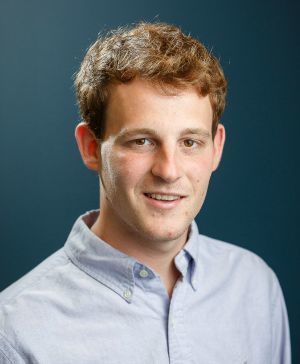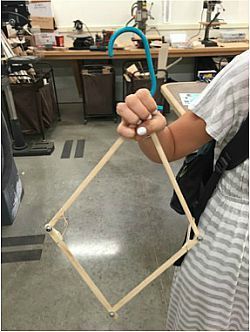
As an undergraduate at Xavier, majoring in environmental science with a minor in business, John Means was looking for a way to combine the two fields. He found it at ESTEEM.
“I wanted to seek out connections between environmental science and business,” Means explains. “They seemed to be two entirely separate things – doing something environmentally positive and generating profits and revenues. Business is what got me interested in ESTEEM. I started checking it out and looking at some of the projects that other students were doing. There was a lot of connection to environmentally-focused projects. They really push you to do something that has a greater social impact. That definitely caught my eye, and I saw there was opportunity there for me.”
Means, who spent two summers as an intern testing water quality in Pittsburgh, wound up working on an air purification project with Nanosynth of Salt Lake City for his capstone thesis this year. The early-stage device converts toxic gases into inert gases, water, and carbon dioxide. The firm shares his passion for applying technology to social benefit. “They’re an awesome company doing a lot of great things, from tuberculosis detection to air and water purification,” he says. The device he is developing will help the regulation-driven oil and gas industry reduce environmental impact at significantly lower cost than current technology.

In addition to the capstone, Means says his business classes have provided an entrepreneurial dimension missing from his undergraduate minor. In Financial Modeling, he helped develop a five-year spreadsheet model that identified key drivers to a business’s success, a critical forecasting skill to avoid the frequent failure of startups. In Marketing, he learned the value of a tagline and the importance of condensing his 6- to 9-minute product description to a 60- to 90-second elevator pitch. In Design Entrepreneurship, he spent hours in a lab creating a prototype collapsible hanger that could help amputees manage everyday tasks. He learned the power of a pen and blank paper to inspire brainstorming ideas and images.
“I never thought I was a good artist, but in that class I really enjoyed seeing how everyone has that skill inside of them,” Means says. “You just need to be able to access it and bring it out.
That is definitely not something you get in your typical business minor as an undergrad. The professors are amazing at taking what they know and the curriculum they usually teach and adding that startup twist, molding our class, making it what we need it to be from our background.”
The ESTEEM experience has accelerated his passion and optimism for making a difference with discovery-based entrepreneurship. “Whenever I started taking environmental science, it got depressing to a point,” Means says, recalling classes about solutions that created new problems. “It seemed almost to a point where this is a little overwhelming, but I saw the need for people to go out there and innovate and make it the core of a company. It has to be what’s driving you to make the challenges. Environmental issues are all interconnected. One thing that we change here can change something across the world.”